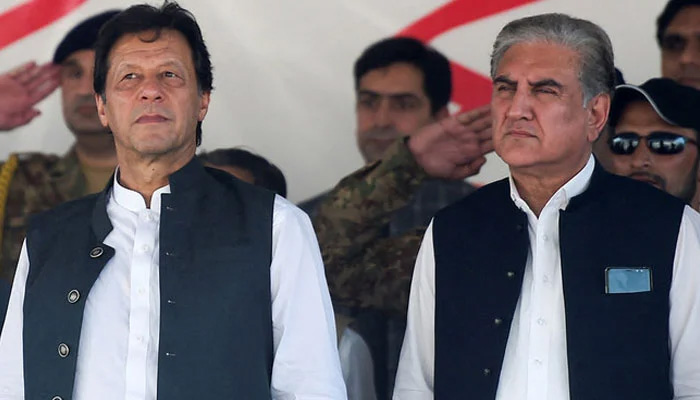Imran, Qureshi's acquittal in cipher case challenged in SC
IHC's verdict perverse, arbitrary, and contrary to material available on record, says FIA
ISLAMABAD: The acquittal of Pakistan Tehreek-e-Insaf (PTI) founder Imran Khan and vice chairman Shah Mahmood Qureshi in the cipher case was challenged in the Supreme Court by the Federal Investigation Agency (FIA) on Thursday.
The Islamabad High Court (IHC) had on June 3 nixed the conviction of the jailed PTI founder and Qureshi in the infamous case containing charges of misusing and misplacing the classified diplomatic document.
The former prime minister and foreign minister were sentenced to 10 years each in prison in the cipher case in January this year, just days before the February 8 elections.
The diplomatic cable controversy first emerged on March 27, 2022, when Khan while addressing a public rally waved a letter before the crowd, claiming that it was a cipher from a foreign nation that had conspired with his political rivals to have PTI government overthrown.
He did not reveal the contents of the letter nor did he mention the name of the nation it came from. But a few days later, he accused the United States of conspiring against him and alleged that Assistant Secretary of State for South and Central Asia Affairs Donald Lu had sought his removal.
The former prime minister, claiming that he was reading contents from the cipher, said that "all will be forgiven for Pakistan if Imran Khan is removed from power".
In its petition submitted to the top court, the FIA said that the high court's judgment is perverse, arbitrary, and contrary to the material available on the record "as such liable to be set aside".
The agency said that the IHC while passing judgment, did not appreciate that it lacks jurisdiction or power to create rights, which are not provided by the Constitution or a validly enacted law.
"It was neither a case of casus omissus nor necessitated application of doctrine of reading in as no constitutional guarantees have been violated," the petition read.
The plea said that the respondents — Imran and Qureshi — were non-cooperative throughout the trial and they made "[e]very possible efforts to delay the proceedings".
"The matter was number of times adjourned on the request of the respondents or their counsels. The witnesses remained present in the court but their cross examination was not carried out by the defense counsels."
The petition mentioned that the prosecution produced documentary evidence along with its forensic analysis through reliable and confidence-inspiring evidence which was not negated during the cross-examination, but this aspect has not been "appreciated by the Honourable Division Bench of Islamabad High Court, while acquitting the respondents".
"...the impugned judgment does not reflect any ground of acquittal of the respondent[s], even it is not observed that the prosecution has failed to prove its case beyond any shadow of doubt."
-
Security forces gun down 30 terrorists in multiple IBOs in KP: ISPR
-
MQM-P calls for new province in Sindh
-
US report validates Pakistan military edge over India: PM
-
Banned TTP poses serious threat to Pakistan security: UNSC panel
-
CM Afridi clarifies remarks on by-poll after ECP requests army deployment
-
Dubai sees 3.2m Pakistani passengers in 2025 as airport sets new milestone
-
Security forces kill 23 Indian proxy terrorists in KP's Kurram
-
Pakistan to construct island to boost oil exploration: report












